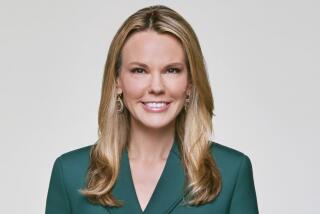Networks Wary of Time-Warner Merger Deal : NBC President Says Government Rules Give Proposed Giant Competitive Edge
- Share via
NEW YORK — The president of NBC said Monday that his company will ask Congress for the ability to compete on even terms with the giant entertainment company to be formed by the merger of Time Inc. and Warner Communications.
“We want equal treatment. . . . Our primary objective is a level playing field,” said Robert C. Wright, whose stated goal was echoed by CBS spokesman George Schweitzer.
The Time-Warner combination, disclosed over the weekend and still subject to government approval, caused reverberations at the three major networks, although ABC’s initial reaction was muted.
“We’re interested in it, we’re studying it, but we have nothing to add to the public discussion right now,” said Patty Matson, spokeswoman for Capital Cities/ABC Inc.
Both NBC and CBS noted that the proposed new entertainment giant, unlike the networks, isn’t subject to government rules that apply to the networks; this includes limits on entering the profitable program syndication markets domestically and overseas.
The proposed merger, Schweitzer said, is “a glaring example of how our competitors in this industry can build giant media companies while the three networks are restricted by outmoded and unfair government regulation.
“The networks couldn’t have done either side of this deal.”
Expires in 1990
He cited as examples the Federal Communications Commission’s ban on cable ownership by networks, and the FCC’s financial interest and syndication rules that bar them from syndicating programs in which they have a financial interest.
Under a Justice Department consent decree reached in the early 1970s, the networks also are limited--the restriction now is five prime-time hours each per week--in how much programming they can produce.
That limit is due to expire in November, 1990, “and we could make as much as we want,” Wright said. But it wouldn’t help, he added, because under the current rules the networks couldn’t syndicate the programs domestically.
Warner Bros. Television, which is owned by Warner Communications and includes Lorimar, has 17 network programs airing in prime time, among them “Dallas” and “Falcon Crest.”
Time owns Home Box Office and Cinemax Cable channels, which respectively serve 7,000 and 5,000 cable systems, and both Time and Warner Communications are among the nation’s largest owners of cable outlets.
“The attractiveness of these two companies is primarily the tremendous syndication business. . . . That’s the guts” of the proposed merger, Wright said.
In April, his company plans to start a new financial and sports cable service, CNBC. ABC owns 80% of the highly profitable ESPN cable sports service, while CBS has no cable programming ventures.
“Nobody knows at this point,” CBS’ Schweitzer replied when asked what impact the proposed Time-Warner merger might have on the networks. “But it’s certainly an exciting combination . . . and obviously we’ll be watching it with interest.”
He said no decision has been made yet whether CBS will seek action in Washington as the proposed merger makes its way through the regulatory process.
‘Need Flexibility’
Wright, who is also NBC’s chief executive, spoke by phone from San Diego, where network executives are holding their annual management meeting. He said NBC will keep a close eye on that process.
“We would hope that whatever (federal agencies) review this, that they review it with an eye toward withdrawing any objections they had back in 1983 to the repeal” of the FCC’s financial-syndication rules, Wright said.
“The real issue is that we’re a network programming company, and we need the flexibility to produce, own, and sell those programs around the world,” he added.
More to Read
The biggest entertainment stories
Get our big stories about Hollywood, film, television, music, arts, culture and more right in your inbox as soon as they publish.
You may occasionally receive promotional content from the Los Angeles Times.










